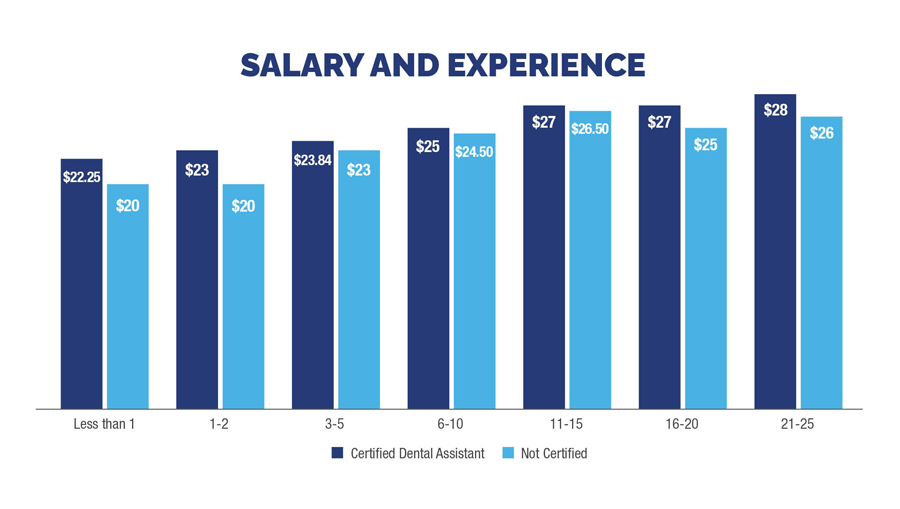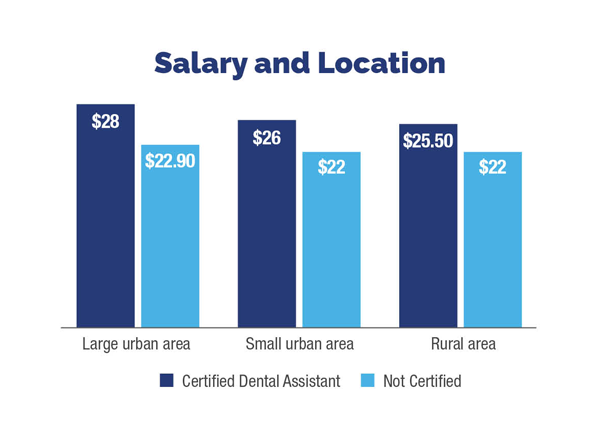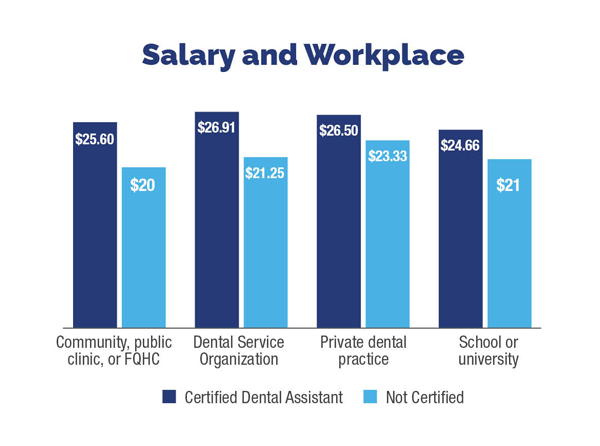The complete guide to Certified Dental Assistant pay

Decades of data show that one of the greatest indicators of higher earning potential is certification. According to DANB’s 2024 Dental Assistants Salary and Satisfaction Survey, CDA certificants reported earning $26 per hour — that’s 15% more compared to dental assistants who are not certified, who earned $22.50 per hour.
“I’ve earned a level of respect from my peers through my CDA certification. It has also impacted my salary in a positive way. It’s a win-win!” says Tracey Cipriano, CDA, RDA, of Fort Worth, Texas.
But even among CDAs, there are other factors that impact salary, including location, experience, and their role within the dental office. Read on for a complete guide to Certified Dental Assistant pay.
Certification enhances experience
It’s not surprising that dental assistants’ wages tend to increase as their careers progress — CDAs with less than one year of experience earn $22.25 an hour, while those with 21-25 years of experience earn $28 per hour.
But across all years of experience, CDAs earn more than non-certified dental assistants. Certified Dental Assistants with 1-2 years of experience earn over $5,000 more per year than non-certified assistants, earning a national median of $23 per hour.
“CDA certification helped me start my career with knowledge and experience,” says Lindsay Kucharski, CDA, of Valparaiso, Indiana. “It also helps me keep learning with continued education, keeping my skills fresh and my knowledge up-to-date.”

Location matters
Dental assistants’ wages can vary depending on location and workplace. In all settings, Certified Dental Assistants earn more than non-certified assistants.
Certified Dental Assistants in large urban areas earn a median national average of $28 per hour compared to CDAs in rural areas, who earned $22 per hour. The pay difference between urban and rural locations is related to factors such as the higher cost of living in large cities and the increased demand for dental assistants to serve large populations.
Practice settings can also affect pay. For instance, CDAs who worked for private dental practices and Dental Service Organizations (DSOs) earned around $26 per hour. Private practices are owned and operated by one or more dentists who manage all aspects of the practice, from clinical care to administration. DSOs provide non-clinical support services to multiple dental practices, such as HR, billing, and marketing. Individual dentists who own their practices may rely on the DSO for administrative and operational support.
“I have been a CDA for 12 years, earning a good income working in hospitals and private dental offices,” says Cenia Francisco, CDA, of Bronx, New York.
Community, public clinic, or Federally Qualified Health Center (FQHC) settings often focus on providing dental services for underserved populations, including low-income individuals, families, and those without insurance. CDAs who work in these locations earned $25.60 per hour, compared to dental assistants who are not certified who made $20 per hour.
Certified Dental Assistants who work in schools or universities earned a national median of $24.66. These dental assistants work in clinics that provide care to patients while serving as a training setting for dental assisting students at the school.


Opportunities for advancement
Earning CDA certification is an important first step to achieving higher pay, but it also provides avenues to receive raises through increased career opportunities. According to the survey results, Certified Dental Assistants are more likely to be leaders in the office and take on new roles that can lead to higher pay.
Lead dental assistant
Lead dental assistants have a supervisory role within a dental practice and are responsible for managing the dental assisting team while ensuring the clinical environment runs smoothly. Given their increased responsibilities, dental assistants who hold CDA certification reported earning an average of $27.25 per hour, which is $2 more per hour than dental assistants who are not certified.
Restorative functions dental assistant
CDAs are prime candidates for performing restorative functions, which include tasks such as placing and finishing direct restorations in a cavity prepared by the doctor. This role helps the dentist work more efficiently, while also increasing dental assistants’ wages.
Building a solid foundation
A variety of factors can impact dental assistants’ pay, but it’s clear that Certified Dental Assistants’ knowledge sets them apart when it comes to career advancement. The increased earning potential among CDAs is significant considering that higher pay was the biggest factor in dental assistants staying in the profession. The difference in pay between dental assistants who feel fairly compensated and those who don’t is $4 per hour.

